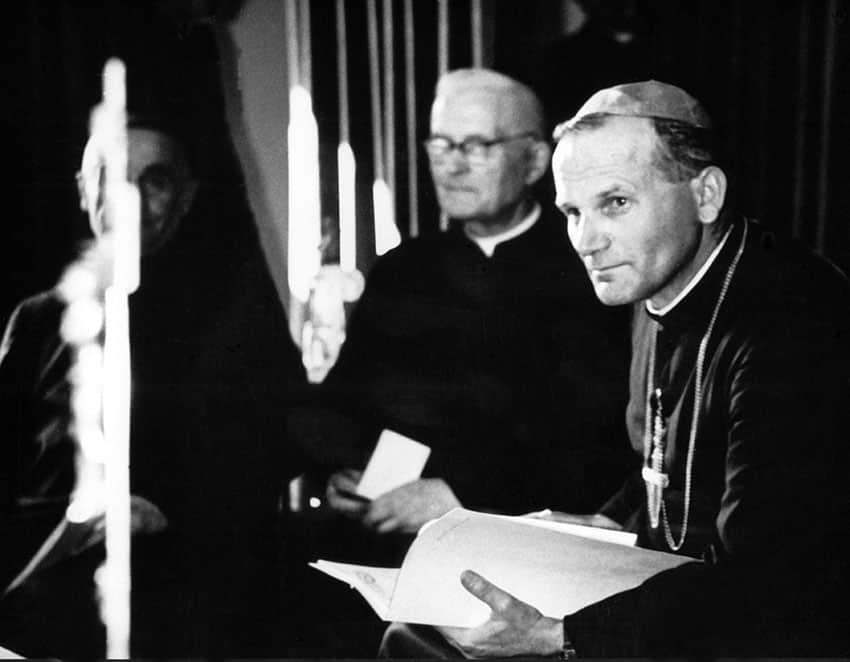
The Theology of the Body is not about sex. Marilyn Rodrigues brought this out in her excellent article of interviews with various academics – but it’s something so rare to hear that’s its important to labour the point: the Theology of the Body is not principally about the sexual act.
It’s a theological anthropology. That’s just a fancy way of saying it’s an exploration of what it means to be human in the light of what Jesus teaches us about what it means to be human.
Jesus should know: He’s God; He creates each human being; He loves human beings better than we do; He became a human being; and He is the only one who lived humanity perfectly off his own bat.
This is an expertise that nobody else has. So if we’re keen to be rational, we’ll do all we can to integrate what his life as a human being, and his teaching gives us. That’s all the pope was trying to do. That’s not to say that there’s nothing about the conjugal act in the Theology of the Body: but it’s only there because John Paul II is considering what it means to be human.
As contemporary tensions around sexuality show very clearly, and as the fact that, in a fallen world, we don’t wander around with our sexual bits uncovered demonstrates just as clearly, our sexual questions evoke the most intimate part of who we are, how we can live who we are, and how we can fulfil our humanity.
“Humanae Vitae had to be written because … its preparatory commission stuffed up the understanding of the human person.”
Sexuality is an important part of being human – and JPII speaks sensitively, thoughtfully and beautifully about it.
But it’s not his main goal. Critics of this point of view will say: hang on a tick – he writes it in response to the most famous papal document about sex in the twentieth century, Humanae Vitae. His whole final chapter is a development of Humanae vitae.
Yes, okay: but before he was pope, Karol Wojtyla was a lecturer and a philosopher. His pre-papal writings show an intense focus on a continual seeking of what it means to be human.
Humanae Vitae had to be written as it was because the majority of its preparatory commission stuffed up the understanding of the human person, which showed a deep need for things to be rethought and clarified both within as well as outside the Church.
The Theology of the Body was considered and drafted before he became pope as a response to this fundamentally flawed anthropology which has marked Western thinking for centuries – and still marks it.
I’ve written repeatedly in these pages in praise of elements of the whole plenary council process.

One of its serious weaknesses was the process’ frequent adoption of a poor, dysfunctional and in some ways unchristian Western anthropology, clearly so destructive to human flourishing and well-being.
It was good to see some attempt in some of the decrees to rectify this, and provide something which actually helps our suffering young people. Suggestions that the Theology of the Body is old hat, or not relevant, or needs to be put aside in the era of Francis don’t work for three reasons.
Given it’s been around for 40 years and almost nobody knows what it is indicates it hasn’t even been given a burl yet: clearly conservative opposition within parts of the Church to cutting edge stuff like this is still a point of conversion for us.
As far as relevance goes: societies which facilitate the killing of innocent people, especially defenceless children, and even teenagers now in some places, are clearly in crisis concerning what the human person is and why and how they should be respected. Clearly the Theology of the Body is needed here.
And thirdly, it’s a bit hard to say that the Theology of the Body is ‘unFrancis’ if some of the severest criticisms he has endured is due to his frank assertions (no pun intended) of fundamental elements of the Theology of the Body. There is a lot of anticipated Laudato si’ in the Theology of the Body.
“The Theology of the Body … is one of the most beautiful accounts you will ever read about why being human is wonderful…”
The Theology of the Body is a weighty and challenging consideration of what it means to be human, within the context of the goodness of the whole of creation, within, in turn, the eternal and perfect love of and between the persons of the Trinity.
Within its demanding pages a gifted intellectual and pastorally-sensitive priest critically engages with the whole of sacred scripture, the richness of 20 centuries of theology, and the latest developments in 20th-Century philosophy in order to articulate in a postmodern world what Jesus was trying to say about being human.
It is one of the most beautiful accounts you will ever read about why being human is wonderful, and why belonging to Jesus Christ is such an effective path to liberating and unifying the body as well as the soul.
Our young people, as well as each of us, personally deserve access to such positive and critically-acclaimed resources.
I can only encourage everyone to sample its content in any of the books, courses, talks or conferences available: perhaps a simple place to start is the brief and easy-to-read Men and Women are from Eden by Dr Mary Healy.
